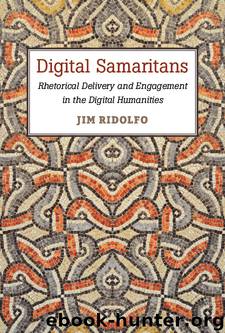Digital Samaritans: Rhetorical Delivery and Engagement in the Digital Humanities by Jim Ridolfo

Author:Jim Ridolfo
Language: eng
Format: epub
Publisher: The University of Michigan Press
Published: 2018-05-15T00:00:00+00:00
In the same special issue of College English, Ellen Cushman argues, “Digital archives, such as the Cherokee Stories and Songs DVD, have captured the imagination of humanities scholars and rhetoric and composition scholars alike for good reason” (115); however, Cushman warns that “[t]he ways knowledge is imparted—through what media, by whom, and for what ends—remain central, though unresolved issues in developing this curriculum, and speak to the troubled and troubling history of archiving” (119).5 Cushman’s warning about who is in charge of imparting knowledge and why knowledge is disseminated intersects with conversations between rhetoric, the digital humanities, and postcolonial studies in which power and knowledge are examined through digital resources.
At the intersection of postcolonial digital humanities and rhetorical studies, scholars Tarez Samra Graban, Alexis Ramsey-Tobienne, and Whitney Myers argue in their chapter “In, Through, and About the Archive: What Digitization (Dis)Allows” that “the most compelling aspects of digitization for rhetoric may come not from building electronic exhibits but from observing how various dilemmas surrounding location, migration, and access inspire new methodologies at the intersection of rhetorical and digital work” (233). Graban, Ramsey-Tobienne, and Myers persuasively argue for a new lens to view digital archives as rhetorical by viewing “the archive as a critical rhetorical space that demands equally of its creators and users” and as a “site for testing theories about how texts migrate among discourse communities” (233). In their chapter, Graban, Ramsey-Tobienne, and Myers also point to a rhetoric of engagement as related to the demands the archive places on creators and user communities. In order to understand what user communities want from digital archives and resources, stakeholder communities must have a role in the creation and circulation of digital resources: in other words, there is a need for engagement. For scholars interested in engaged collaboration with other communities, collaborative relationships must be built, maintained, and nourished.
The process Benyamim Tsedaka used to catalogue the Hebrew Union College Jewish Institute of Religion’s (HUC-JIR) Samaritan manuscript collection at the Cincinnati Klau Library underscores the importance of engagement and Page 80 →collaboration at the edge of post-colonial studies and the digital humanities. While HUC-JIR had institutional finding aids for their large collection of Samaritan manuscripts, Director of Libraries David Gilner encouraged Tsedaka to produce a library catalogue from a Samaritan perspective. Tsedaka’s work was successful, and in 2011 he completed his 162-page English and Hebrew catalogue of HUC-JIR’s collection. Tsedaka’s accomplishment was the first library catalogue of manuscripts ever produced and published by a Samaritan and is an example of university-community engagement to include cultural stakeholder voices in the description of collections.6
Tsedaka’s Hebrew and English catalogue descriptions not only resulted in the print catalogue published by HUC-JIR but were subsequently used in the online digital resource for the Samaritan community7 (http://www.samaritanrepository.org). In her 2014 chapter, “Archive Experiences: A Vision for User-Centered Design in the Digital Humanities,” Liza Potts argues that by producing “connections between rhetoric and the digital humanities, we can focus on engagement . . . both with the internal digital
Download
This site does not store any files on its server. We only index and link to content provided by other sites. Please contact the content providers to delete copyright contents if any and email us, we'll remove relevant links or contents immediately.
Cecilia; Or, Memoirs of an Heiress — Volume 1 by Fanny Burney(32527)
Cecilia; Or, Memoirs of an Heiress — Volume 2 by Fanny Burney(31928)
Cecilia; Or, Memoirs of an Heiress — Volume 3 by Fanny Burney(31916)
The Lost Art of Listening by Michael P. Nichols(7480)
Asking the Right Questions: A Guide to Critical Thinking by M. Neil Browne & Stuart M. Keeley(5741)
We Need to Talk by Celeste Headlee(5597)
On Writing A Memoir of the Craft by Stephen King(4920)
Dialogue by Robert McKee(4374)
Pre-Suasion: A Revolutionary Way to Influence and Persuade by Robert Cialdini(4195)
I Have Something to Say: Mastering the Art of Public Speaking in an Age of Disconnection by John Bowe(3864)
Elements of Style 2017 by Richard De A'Morelli(3331)
The Book of Human Emotions by Tiffany Watt Smith(3282)
Fluent Forever: How to Learn Any Language Fast and Never Forget It by Gabriel Wyner(3066)
Name Book, The: Over 10,000 Names--Their Meanings, Origins, and Spiritual Significance by Astoria Dorothy(2962)
Why I Write by George Orwell(2933)
Good Humor, Bad Taste: A Sociology of the Joke by Kuipers Giselinde(2931)
The Art Of Deception by Kevin Mitnick(2782)
The Grammaring Guide to English Grammar with Exercises by Péter Simon(2728)
Ancient Worlds by Michael Scott(2661)
